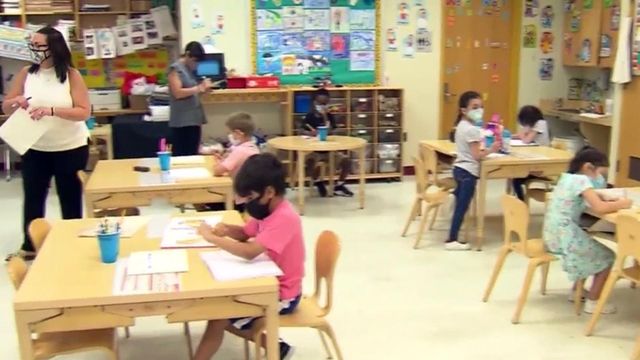UK variant affecting children, researchers say
A coronavirus variant first identified in the U.K. has long been known to be more contagious and more likely to make people sick than the initial form of the virus, but researchers now say it also is more likely to affect children as well.
Posted — UpdatedA coronavirus variant first identified in the U.K. has long been known to be more contagious and more likely to make people sick than the initial form of the virus, but researchers now say it also is more likely to affect children as well.
The B.1.1.7 variant is at least 50 percent more infectious, and the Centers for Disease Control and Prevention said it poses an increased risk of severe illness.
The variant accounted for 8.3 percent of positive virus tests in North Carolina for the four-week period that ended March 13, up from 1.3 percent for the four week period that ended Feb. 27, state Department of Health and Human Services spokeswoman Catie Armstrong said.
"Because of its greater contagiousness, it’s more transmissible, [and] it is becoming more and more prevalent," Montefiori said.
Children also are showing symptoms when infected with B.1.1.7, he said.
"There are quite a few cases of kids who are getting really, really sick when they get infected with this variant,” he said. "I personally feel like we probably pulled the trigger a little too soon in terms of letting kids go back to school.”
But Dr. Daniel Benjamin, the Kiser-Arena Distinguished Professor of Pediatrics at Duke University, disagrees.
"When we talk about low risk, we are talking extraordinary low risk,” Benjamin said of having students in classrooms.
Benjamin leads the ABC Science Collaborative, which has worked with school districts since last year to reopen safely.
"The bottom line about variants is that they don’t get through masks any more than COVID did six months ago," he said. "If [students] are not masking – and mask fatigue outside of the school environment is certainly happening – then it’s more transmissible. Therefore, more children are getting infected."
Physicians say prevention efforts outside of school will be key in keeping the virus out of the classroom.
The severity of the the U.K. variant isn't specific to children, according to state health officials, who encourage people of all ages to get vaccinated as soon as possible.
"For parents of children who are eligible to get the vaccine, now is the time to start getting the vaccine, especially if they are going to participate in contact sports,” Benjamin said.
Available vaccines have proved effective in fighting the B.1.1.7 variant, but only the Pfizer vaccine has been authorized for 16- and 17-year-olds. Tests are still being conducted on the safety and efficacy of vaccines in younger teens and children.
Pfizer has reported its vaccine is 100 percent effective among 12- to 15-year-olds. The company could seek emergency use authorization for that age group as early as May.
Until then, Montefiori recommends following the well-known "three W's" to keep youngsters safe.
"We don’t have to keep them locked up in their rooms 24/7, but use common sense," he said. “Stay away from crowded places, have them wear their masks [and] have them wash their hands frequently."
Related Topics
• Credits
Copyright 2024 by Capitol Broadcasting Company. All rights reserved. This material may not be published, broadcast, rewritten or redistributed.





